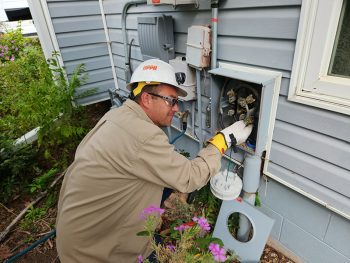From storm recovery to rooftop solar, OPPD’s meter technicians stay busy

Brian Esser never quite knows where his workday will take him.
On some calls, the OPPD meter technician inspects, tests and replaces meters to ensure that customers aren’t paying too much or too little for the electricity they use. Other times, he’s in a backyard helping homeowners who just installed rooftop solar panels.

When a storm rips through OPPD’s service territory, Esser and other meter technicians repair downed power lines leading to homes. And then there’s the sensitive work involving business customers who haven’t paid their bills.
Like other utilities, OPPD is always working to ensure that customers are billed accurately for the electricity they consume. That information is tracked with digital meters that measure the energy flowing through every home, business, school and other buildings. OPPD uses the data to calculate customer bills.
“You want it to be accurate,” said Esser, a former airplane mechanic and Nebraska City Utilities line technician. “It’s someone’s bill.”
Meter technicians are primarily solo operators who play a critical role in OPPD’s efforts to deliver reliable, affordable and sustainable power to customers.
“There’s a nice level of autonomy,” said Metering Services Field Supervisor Justin Robinson. “They’re lone workers and they really get to determine what their day looks like. Every day is going to be a little different, and I think that change of pace, that variety of work, is what’s really rewarding for them.”
On the job
When big storms wipe out power for large numbers of customers, meter technicians remove broken tree limbs and repair overhead services to restore power to individual homes, allowing line crews to focus on larger neighborhood circuits. During the July 2021 storm that caused widespread outages, meter technicians worked seven consecutive 16-hour days in the field.
“It’s the most important work we do,” Robinson said.
Meter technicians need technical knowledge, for sure, but the job also requires a mix of people skills and the ability to de-escalate tough situations.
One recent morning, Esser walked into an Omaha auto repair shop whose electric bill was well past due. His task: give a final notice and offer the owner one last opportunity to pay.
Esser introduced himself politely and explained the situation to an employee, who promised to call the owner right away.
“He doesn’t need to go to the office,” Esser said. “Just have him call OPPD, he can pay over the phone. Maybe they can work out a payment plan. If he pays it in the next few hours, they’ll take this call away from me. But it needs to be done by noon, otherwise, we’re going to have to shut off the power, and we really don’t want to do that.”
The worker nodded. “OK, OK. Thank you so much.”
A few hours later, Esser checked his online call sheet. The call was gone. The customer had paid.
In most cases where customers are past due on their bill and haven’t responded to earlier notices, Esser said, a courteous, in-person visit is enough of a nudge. Customers who want to verify their billing status can call the utility directly to avoid potential scammers.
‘Our customer, our partner’
“It’s true that OPPD is our customers’ energy partner,” Esser said, referring to OPPD’s motto. “By the time I leave, I want you to have power. I don’t want to turn it off. You’re our customer, our partner, and my job is to help ensure that you have power today.”
Occasionally, meter technicians encounter customers who tried to restore their own power after OPPD has shut them off. Some customers use jumper cables, butter knives or plain metal strips to bypass their electrical meter and reconnect to power lines (as you might suspect, this is incredibly dangerous and illegal, and OPPD will catch it).
“It blows my mind what we find,” Esser said. “You’ll see arc flashes, you’ll see melted metal. I have to be very careful fixing some of it with all of my (protective equipment) on, and I know what I’m doing.”
Getting started
Meter technicians enter the job through a four-year apprenticeship, which can be shortened to two years for experienced electricians and others who pass an equivalency exam.
In most cases, OPPD seeks candidates with two years of trade school or comparable experience. When OPPD’s Fort Calhoun Station closed, for instance, several production electricians and instrumentation technicians at the nuclear plant became meter technicians and quickly excelled.

“We’ve got a great group here, and everyone gets along,” said Ben Schenkelberg, the metering department’s working crew leader. “Knowledge is important, for sure, but I think attitude is probably the biggest thing.”
New members of the team must also take 58 written exams – typically one to two per week – during their apprenticeship to show they’re building the necessary technical knowledge for the job. Gaining hands-on experience is a must.
Meter techs work two-month shifts in different areas of their trade: testing meters for accuracy, setting up meter service for new commercial buildings, and working out in rural areas, to name a few. They routinely partner with line crews on projects.
“There’s no monotony,” Esser said.
When a meter isn’t working properly, meter technicians either fix or replace them. Sometimes the job is as simple as scrubbing corrosion off a few bad connections. Other projects require a full rebuild.
Esser said he appreciates OPPD’s focus on safety and its refusal to push employees into dangerous or questionable situations.
“They put the person first,” he said. “If you’re uncomfortable with a job, you can leave and regroup. Nobody questions that. I love the support the company gives us.”
Helping homeowners, businesses
Meter techs perform “witness tests” on customers with newly installed rooftop solar panels, making sure the setup is correct to ensure they’re safe. Because most modern solar panels can feed electricity back into the grid, it’s imperative that they have safeguards to protect OPPD workers who might believe that a line is dead when responding to an outage.
Meter technicians also measure the “power factor” of larger customers to gauge their efficiency. The test records the amount of power from OPPD that is doing useful work – lighting a business, running computers – versus “wasted” electricity that is merely heating up wires. An 80% power factor means that only 80% of incoming current is doing useful work.
Think of it as a beer.
“If you have a glass of beer with a big head on it, you still have a full glass of beer,” Esser said. “But how much of it is wasted on the head? You can’t drink the head, but it’s still taking up space in your glass.”
Big changes ahead
Meter techs are likely to see big changes in coming years with the rise of advanced metering infrastructure, a two-way communication system that will provide OPPD with lots of useful data to better serve customers. The new system will eventually help the utility discover and pinpoint outages without customers calling in their outages.
Meter techs will likely work more with data on a typical day. New technology is also expected to make it easier to find meters.
Robinson said OPPD plans to send a meter technician to OPPD’s AMI Accelerator team, which will be a three-year commitment as the utility prepares for a soft launch of its Advanced Metering Infrastructure network. Additionally, OPPD expects to hire more meter technicians to meet growing demand for their services.
“It’s a really exciting time to be getting in this field,” Robinson said. “Everything we do is going to change. It’s going to have a tremendous impact on everything we do.”
The “What It Takes” series explores the fascinating, fulfilling and sometimes surprising jobs available at OPPD, and what it takes to get hired for those jobs.

Grant Schulte joined OPPD as a content generalist in 2022. He is a former reporter for The Associated Press, where he covered the Nebraska Legislature, state politics and other news for a global audience. He is a graduate of the University of Iowa and a proud Hawkeye. In his free time he enjoys running, reading, spending time with his wife, and all things aviation.
View all posts by Grant Schulte >


